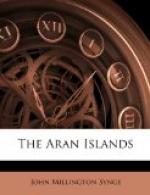Once on shore I had some difficulty in finding any one to carry my baggage to the railway. When I found a man in the darkness and got my bag on his shoulders, he turned out to be drunk, and I had trouble to keep him from rolling from the wharf with all my possessions. He professed to be taking me by a short cut into the town, but when we were in the middle of a waste of broken buildings and skeletons of ships he threw my bag on the ground and sat down on it.
‘It’s real heavy she is, your honour,’ he said; ’I’m thinking it’s gold there will be in it.’
‘Divil a hap’worth is there in it at all but books,’ I answered him in Gaelic.
‘Bedad, is mor an truaghe’ (’It’s a big pity’), he said; ’if it was gold was in it it’s the thundering spree we’d have together this night in Galway.’
In about half an hour I got my luggage once more on his back, and we made our way into the city.
Later in the evening I went down towards the quay to look for Michael. As I turned into the narrow street where he lodges, some one seemed to be following me in the shadow, and when I stopped to find the number of his house I heard the ‘Failte’ (Welcome) of Inishmaan pronounced close to me.
It was Michael.
‘I saw you in the street,’ he said, ’but I was ashamed to speak to you in the middle of the people, so I followed you the way I’d see if you’d remember me.’
We turned back together and walked about the town till he had to go to his lodgings. He was still just the same, with all his old simplicity and shrewdness; but the work he has here does not agree with him, and he is not contented.
It was the eve of the Parnell celebration in Dublin, and the town was full of excursionists waiting for a train which was to start at midnight. When Michael left me I spent some time in an hotel, and then wandered down to the railway.
A wild crowd was on the platform, surging round the train in every stage of intoxication. It gave me a better instance than I had yet seen of the half-savage temperament of Connaught. The tension of human excitement seemed greater in this insignificant crowd than anything I have felt among enormous mobs in Rome or Paris.
There were a few people from the islands on the platform, and I got in along with them to a third-class carriage. One of the women of the party had her niece with her, a young girl from Connaught who was put beside me; at the other end of the carriage there were some old men who were talking Irish, and a young man who had been a sailor.
When the train started there were wild cheers and cries on the platform, and in the train itself the noise was intense; men and women shrieking and singing and beating their sticks on the partitions. At several stations there was a rush to the bar, so the excitement increased as we proceeded.
At Ballinasloe there were some soldiers on the platform looking for places. The sailor in our compartment had a dispute with one of them, and in an instant the door was flung open and the compartment was filled with reeling uniforms and sticks. Peace was made after a moment of uproar and the soldiers got out, but as they did so a pack of their women followers thrust their bare heads and arms into the doorway, cursing and blaspheming with extraordinary rage.




